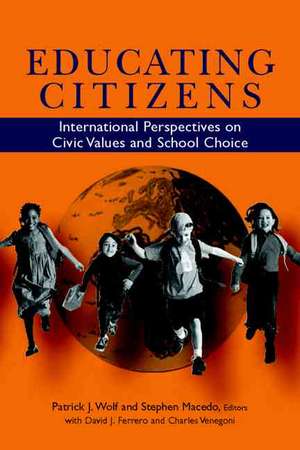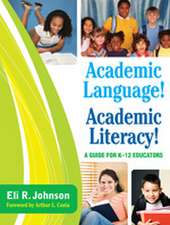Educating Citizens: International Perspectives on Civic Values and School Choice
Editat de Patrick J. Wolf, Stephen Macedo Cu David J. Ferrero, Charles Venegonien Limba Engleză Paperback – 30 sep 2004
The United States is in the midst of historic experiments with publicly funded choice in K-12 education, experiments that recently received a "green light" from the Supreme Court. Other nations have long experience with the funding and regulation of nonpublic schools, including religious schools. This book asks what U.S. policymakers, public officials, and citizens can learn from these experiences. In particular, how do other countries regulate or structure publicly funded educational choice with an eye toward civic values—looking not only for improvements in test scores, but also in tolerance, civic cohesion, and democratic values such as integration across the lines of class, religion, and race?
The experience of Europe and Canada with school choice is both extensive and varied. In England and Wales, public school choice is widespread, as parents play a significant role in selecting the school their children will attend. In the Netherlands and much of Belgium, a majority of students attend religious schools at government expense. In Canada, France, and Germany, state-financed school choice is limited to circumstances that serve particular social and governmental needs. In Italy, school choice has just recently arrived on the policy agenda. In spite of the diversity of national experiences, in all of these countries choice is regulated by the government in significant and varied ways to promote civic values. In several of these countries, school choice policy itself appears to have played an important role in promoting social cohesion and integration. This book presents a wealth of experience designed to aid policymakers and citizens as they consider historic changes in American public education policy.
The experience of Europe and Canada with school choice is both extensive and varied. In England and Wales, public school choice is widespread, as parents play a significant role in selecting the school their children will attend. In the Netherlands and much of Belgium, a majority of students attend religious schools at government expense. In Canada, France, and Germany, state-financed school choice is limited to circumstances that serve particular social and governmental needs. In Italy, school choice has just recently arrived on the policy agenda. In spite of the diversity of national experiences, in all of these countries choice is regulated by the government in significant and varied ways to promote civic values. In several of these countries, school choice policy itself appears to have played an important role in promoting social cohesion and integration. This book presents a wealth of experience designed to aid policymakers and citizens as they consider historic changes in American public education policy.
Preț: 237.84 lei
Nou
Puncte Express: 357
Preț estimativ în valută:
45.52€ • 49.42$ • 38.23£
45.52€ • 49.42$ • 38.23£
Carte tipărită la comandă
Livrare economică 23 aprilie-07 mai
Preluare comenzi: 021 569.72.76
Specificații
ISBN-13: 9780815795179
ISBN-10: 0815795173
Pagini: 397
Dimensiuni: 152 x 229 x 27 mm
Greutate: 0.56 kg
Editura: Brookings Institution Press
Colecția Brookings Institution Press
ISBN-10: 0815795173
Pagini: 397
Dimensiuni: 152 x 229 x 27 mm
Greutate: 0.56 kg
Editura: Brookings Institution Press
Colecția Brookings Institution Press
Notă biografică
Patrick J. Wolf is associate professor of public policy at Georgetown University. Stephen Macedo is the Laurence S. Rockefeller Professor of Politics and director of the University Center for Human Values at Princeton University. David J. Ferrero is director of evaluation and policy research for education programs at the Bill and Melinda Gates Foundation. Charles Venegoni is president of Civitas Schools in Chicago.
Descriere
The United States is in the midst of historic experiments with publicly funded choice in K-12 education, experiments that recently received a "green light" from the Supreme Court. Other nations have long experience with the funding and regulation of nonpublic schools, including religious schools. This book asks what U.S. policymakers, public officials, and citizens can learn from these experiences. In particular, how do other countries regulate or structure publicly funded educational choice with an eye toward civic values—looking not only for improvements in test scores, but also in tolerance, civic cohesion, and democratic values such as integration across the lines of class, religion, and race?
The experience of Europe and Canada with school choice is both extensive and varied. In England and Wales, public school choice is widespread, as parents play a significant role in selecting the school their children will attend. In the Netherlands and much of Belgium, a majority of students attend religious schools at government expense. In Canada, France, and Germany, state-financed school choice is limited to circumstances that serve particular social and governmental needs. In Italy, school choice has just recently arrived on the policy agenda. In spite of the diversity of national experiences, in all of these countries choice is regulated by the government in significant and varied ways to promote civic values. In several of these countries, school choice policy itself appears to have played an important role in promoting social cohesion and integration. This book presents a wealth of experience designed to aid policymakers and citizens as they consider historic changes in American public education policy.
The experience of Europe and Canada with school choice is both extensive and varied. In England and Wales, public school choice is widespread, as parents play a significant role in selecting the school their children will attend. In the Netherlands and much of Belgium, a majority of students attend religious schools at government expense. In Canada, France, and Germany, state-financed school choice is limited to circumstances that serve particular social and governmental needs. In Italy, school choice has just recently arrived on the policy agenda. In spite of the diversity of national experiences, in all of these countries choice is regulated by the government in significant and varied ways to promote civic values. In several of these countries, school choice policy itself appears to have played an important role in promoting social cohesion and integration. This book presents a wealth of experience designed to aid policymakers and citizens as they consider historic changes in American public education policy.














